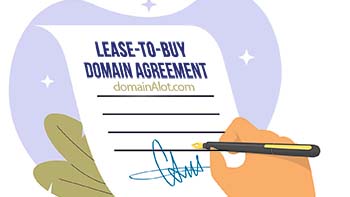Why End-Users Miss Out on Great Domains
Hesitating on a great domain can cost you more than money, it can cost you your brand identity.

Every day, someone, somewhere misses out on a domain that could have defined their brand. Sometimes it's because they moved too slowly, sometimes because they underestimated the value, and sometimes because they simply didn't realise how quickly good names disappear.
What is consistent though, is that most of these missed opportunities are preventable.
When Hesitation Costs More Than the Price Tag
In 1994, the journalist Joshua Quittner famously asked McDonald's if they wanted to register mcdonalds.com. The company said no. Actually, what they said was that it wasn't interested because they didn't see the relevance. So, Quittner subsequently registered it himself as part of a Wired Magazine article to prove his point. Now, when you have a globally recognised brand like McDonald's, there's little you can do to prevent them doing what they want, and they eventually got the domain back, but the story became a classic lesson: the digital world rewards foresight.
And why am I telling you this? Well, fast-forward a few decades and guess what? Even giants like Tesla learned the same truth.
For years, Tesla operated under teslamotors.com because tesla.com was owned by a Silicon Valley engineer who registered it long before Elon Musk's company existed. In fact, it wasn't until 2016, over ten years later, that Tesla finally secured tesla.com after paying what was rumoured to be a substantial sum.
That's a long wait and an expensive correction for something that could have been solved early on with a few hundred dollars.
The Startup Trap
For startups and small businesses, the same story unfolds daily, in smaller, but equally painful ways.
A founder will launch with a compromised domain like brandnameversion.com or brandnameapp.io because the exact match feels "too expensive" or "unnecessary," so, decides it's best to wait. Then, once the brand gains traction, they discover the owner of the actual brandname.com isn't interested in selling, or, as is more often the case, that the asking price has skyrocketed.
In 2011, the founders of HotelsTonight admitted that one of their early mistakes was not securing hotelstonight.com. Before launch, they discovered the domain was taken by another party who were demanding a high price to relinquish their digital asset. Rather than negotiate, or consider the implications of growth, the founders settled temporarily for hotelstonightapp.com, which confused users and weakened their marketing efforts. Sadly, it was only after discovering the impact this had on both the brand and the business, that they eventually sought to find a solution, and that meant they had to pay a premium to acquire the correct name once their app gained popularity. The moral of the story? Waiting for the right domain not only cost them money. but more importantly, credibility.
Why Businesses Often Delay?
It might seem obvious to many, but in the world of domain ownership, one question arises every single day.
Why do intelligent, capable business owners miss their opportunities?
Well, to answer, here are three all too common reasons:
- Perception of Cost: Many see a five-figure domain and assume it's far "too much." But few consider the long-term marketing and trust value a strong domain delivers. A memorable, keyword-rich name can reduce advertising spend, improve SEO, and build instant credibility. In other words, provide value far greater than the investment itself.
- Overconfidence: Amazingly, there are those who still believe they can always find something similar later. But domains are unique digital assets. Once gone, they rarely return, and availability, no matter what one might think, will always be extremely limited, especially for sought after domain extensions.
- Underestimating Digital Identity: Ask any entrepreneur and they'll tell you that in the early stages of their startup, brand and domain decisions feel secondary to product development or funding. The lesson that is inevitably learned is that once public perception takes hold, rebranding is far more expensive than buying the right domain upfront.
The Psychology of Hesitation
In addition to perhaps failing to understand the basic principles of digital real-estate, there's also a psychological side to domain ownership. Many end-users approach domain negotiation emotionally and can often feel as though the seller is "holding their name hostage."
While such thoughts can be understandable, most professional domain owners price domains based on data: keyword demand, search volume, brandability, and comparable sales.
An inexperienced buyer, dismissing those valuations outright often means walking away from an asset that would later pay for itself many times over.
With that said, and trying to remain impartial, I must admit that some domain appraisals I have seen upon some of the larger domain registrar sites appear to be wholly speculative and without basis on data at all. For example, it is difficult to defend a domain owner valuing a non-sensical domain name for a five-figure sum with a .fit extension, and in such instances, I can certainly synmpathise with any buyer reluctance.
Flexible Paths to Ownership
Another major misconception is that acquiring a premium domain requires full payment upfront. In truth, there are now several flexible options available to end-users looking to acquire their perfect domain:
- Payment Instalments: The actual cost of the domain is divided across a number of fixed monthly payments, allowing a business to secure ownership while spreading the cost over time. The advantage of Payment Instalments is obvious, allowing the buyer to begin using the domain immediately, even before full ownership, as transfer typically occurs on completion of the final instalment.
- Lease-to-Own: Also known as "Lease-to-Buy", this option allows the domain to be leased for an agreed duration of time, during which the lessee also has the option to purchase the domain outright should they wish. This lets businesses test their brand before committing, as well as lease over longer periods than the Payment Instalment option typically allows, effectively allowing the lessee to acquire the domain for the owners asking price, but over a longer time frame.
These models open the door for startups and established companies alike to compete for premium names without overextending financially.
The Digital Real Estate Analogy
The reason I referred to the basic principles of digital real estate previously is because a good way to think about domains is as actual property.
In the physical world, people invest in desirable locations because they hold value, and digital real estate is no different in following the same rule.
A domain like digitalmargin.com or unitical.com isn't just an web address, it's an identity, a brand foundation, and often a competitive moat.
The businesses that understand this early are the ones who quietly gain an advantage that's hard to replicate as others scramble to acheive a "next best alternative."
It All Starts With A Name
Every great brand starts with a name, and that name lives online as a domain.
Some domains become Go-To hubs for users. Others become support and community based platforms for interaction and sharing. Others become the storefront for products and services. While for others, their company grows so dependent upon their domain that it arguably becomes synonomous with the domain itself. Such a thought, twenty, or even ten years ago might have seemed outrageous, but it's anything but now. If anything, it's increasingly commonplace.
Whatever the intended function of your domain, one thing is consistent. Your domain is the basis of your digital profile, a profile that is nothing less than the electronic identity of your company towards your users, customers, markets, and sales.
We no longer live in a traditional world, where the majority of music is played rather than streamed, or films consumed at the cinema rather than in front of the television or a mobile device. Every app, every streaming service, every modern clothing store, every product or service that is promoted today relies ever greatly upon it's digital domain, and for an ever increasing number of businesses and startups, their digital identity is no longer their virtual domain. It's their only one. The only one of value at least. Missing out on the right domain doesn't just mean a less tidy URL, or the hope that users will find you anyway through a less intuitive variant, especially if you advertise it long and hard enough. The truth is, that missing out on the right URL for your venture can affect how your brand is perceived, remembered, and even trusted.
Short-Term Shortcuts
The difference between deltaairlines.com and flydelta.net might seem minor, but in terms of authority, it's enormous.
End-users who take domain strategy seriously from the beginning save themselves years of rebranding, confusion, and unnecessary expense. The digital world moves fast, but opportunity still belongs to those who act early and think long-term. More importantly, the journey of your company will go a lot smoother and arrive with a lot less friction if it's able to travel without needing to meander continuously.
Responding to resistance and the changes of markets is part and parcel of growing a business. When British Petroleum (BP) were forced to reposition themselves and shift their image from a traditional oil company to a more environmentally friendly one, using the "Helios" sunflower logo, the cost was estimated to be around $211 million (USD). Of course, that was unforseeable, and for a company of its size and age, one could argue that such a shift was inevitable in response to greener energy markets and modern mindsets.
However, when Exodus, the cryptocurrency wallet was founded in 2015, rather than acquire the .com, they opted for the cheaply available .io extension. Trendy and popular, it would appeal to the tech-savvy market, right? Those who were most likely to show interest in a crypto wallet. What could possibly go wrong? Well, less than 5 years later they discovered a problem with traction and the real cause restricting growth. Can you guess what it was? The domain. Because trendy and popular may provide a short-term effect, but it's not a long-term strategy. So, Exodus set about acquiring exodus.com the following year in order to grow the business, but at a cost of over $1.94 million (USD). Or, to put it another way, at a cost of $320,000 (USD) for every year they operated their business before they finally accepted the fact that the right domain name reallly does matter.
Learning From Mistakes, Not Repeating Them
Now, what can you, as an entrepreneur, a startup, or struggling business owner take away from all this?
Well, the Exodus example is by no means the only one of its kind, it's just well-known, but it does give us some idea of just how much revenue they were losing, and/ or believed they could earn by growing their business with the right domain name, if they were willing to use that kind of money in order to make it happen. The big question of course, is what did the owner of exodus.com want in order to sell it in 2015? While this figure can only be imagined, you can bet it was nowhere near $1.94 million (USD). But how could we know this? Because the answer is surprisingly simple, and yet another example of the Startup Trap. You see, before Exodus launched their cryptocurrency wallet, the meaning of "exodus" was generic, but since Exodus themselves managed to build so much "value" into the name by popularising their wallet service, that .io short-term shortcut turned into a very costly long-term mistake, just at it did for HotelsTonight, and just as it did for Tesla.
If you believe that the right domain name for your business is out of reach now, then take a moment to really evaluate the prospective cost of reinventing, repositioning, and reselling your company and services in the future. when your company is not just bigger, but perhaps a thousand times bigger. When the variation of the domain you have been using to gain market share has simultaneously increased the value of the domain you really wanted, only exponentially, and you have inadvertently created a highly-valuable asset that you don't even own.
Beware Domain Variants
And let's not forget the risk: It's not just markets that move fast, users move on even faster.
A domain like myservice.com will always attract users from a domain like myserviceapp.com. It's called Customer Confusion. What this means, is that as the owner of myserviceapp.com, a percentage of the efforts made in marketing and promoting the domain will always be lost to the stronger myservice.com. This is sadly, unavoidable, and as if enough argument has not been made already to stress the need of acquiring, and building upon the right domain from the outset, perhaps this offers yet another insight to help you choose your domain wisely.
As the owner of myserviceapp.com, wasting promotional efforts is less than ideal, however, it might we something you could live with, and in reality, you would have little choice. With that being said, if the owner of myservice.com decides to create a similar product or service offering to you, then there is also another, and more serious added risk. In fact, it might not be just "value" you are building into another domain name, and users you are losing. Without realisiing, many domain owners have helped fund the creation of new, and more aptly positioned competitors. Competitors who are not only gaining market traction from the markerting efforts of others, but who will only continue to do so, as you increase your marketing efforts to try and combat the effect. Now, if that's not a sobering thought for any business owner, then I truly don't know what is.
If you're in doubt, have questions about domain ownership, or wondering how to negotiate and acquire a more competitive domain, then reach out to us. Don't settle for what you think is good enough. Be assured. We're here to help domain buyers and sellers navigate the domain marketplace.




